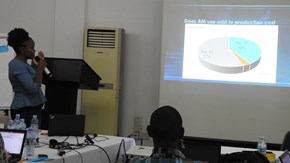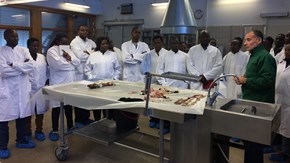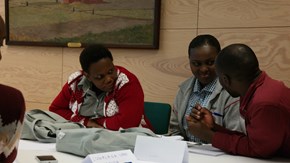The cornerstone of the ITP methodology is a strong interest among participants in learning from each other and use experiences from other countries and organisations. To accentuate the communal learning and the value chain approach, participants come from different scientific backgrounds and different types of organisations within the animal health sector.
The ITP is composed of several interrelated phases and an individual change project. The total duration of the programme is about 12 months. The number of participants is limited to 25 to ensure a close working relationship between the participants.
The change project

The change project is a very important tool for achieving the overall objectives of the programme through institutional changes on a organisational, national, or regional level. These changes may for example lead to a more coordinated approach between different authorities within the sector, or organisations being able to work more effectively towards improved animal health with the smallholder farmer in focus. The projects should be needs driven, executed as an integrated part of the participants’ ordinary work, and fully endorsed by the home organisations. Co-operation with former participants, and with other participants from the same or other countries is encouraged.
The ITP phases
Phase I – The preparatory phase
This phase includes the invitation process and the selection of institutions and participants. A strong commitment towards the programme and the change projects amongst the selected organisations is a precondition for participating in the programme.
Phase II – The start-up phase

This phase involves a digital welcome meeting, as well as a start-up meeting, where participants meet in their respective countries. The aim of the start-up meeting is to provide the participants with the knowledge and skills required to initiate their change projects, as well as to align the projects to the missions of their institution/organisation; to national, regional, and global strategies and policies; as well as the SDGs, for long-term impact.
Phase III – The Regional phase
Phase III is a one-week long workshop, where all participants meet in one of the participating countries to present their projects and to have theoretical lectures, seminars, group discussions and study visits covering the topics of animal health, food safety and antimicrobial resistance. The focus of this workshop is the “farm-perspective” including microbiology, epidemiology, preventive animal health, disease surveillance, animal welfare and an introduction to the Swedish value chain context.
Phase IV – The Intermediate phase

During this phase the participant develop and execute their change projects under the guidance of individual mentors.
In this phase there is also a digital workshop where the participants meet in their respective countries and cover the topics of the “fork-perspective” such as control of foodborne zoonoses, food hygiene and antimicrobial residues.
Phase V – The Sweden phase
In phase V the participants will spend approximately two weeks in Sweden and work together in a tight schedule of theoretical lectures, seminars, group discussions and study visits covering subject of both the farm and the fork-perspective, including animal health, food safety and crisis awareness and preparedness.
Phase VI – The Final phase
Phase VI is the final phase of the programme. The participants finalise their projects with emphasis on the implementation of the project.